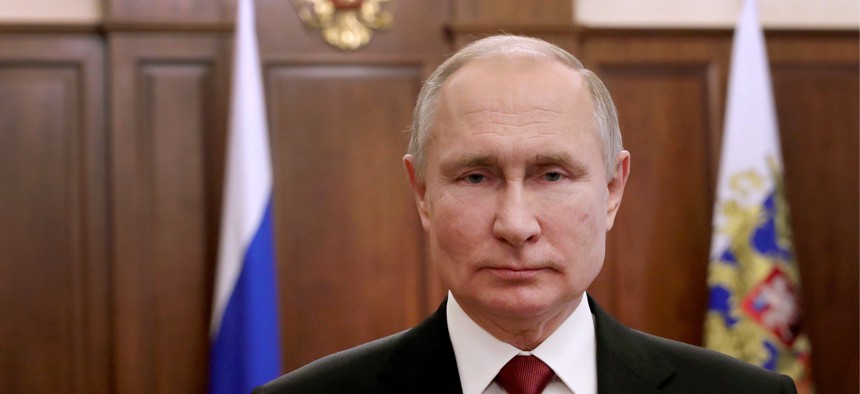U.S. companies warned to prepare for Russian cyberattacks

FEBRUARY 23, 2021: Russia's President Vladimir Putin delivers his address to war veterans, military personnel, civilian staff of the Russian Armed Forces, and Russian citizens in general on Defender of the Fatherland Day via video link from the Moscow Kremlin. Photo by Mikhail Klimentyev\TASS via Getty Images
DOJ’s Lisa Monaco warns industry to harden defenses; Ukraine’s foreign weapons systems are a likely target for Russian hackers.
U.S. companies, particularly in the defense industry, should be prepared for an increase in cyberattacks aimed at stealing data or disrupting operations as a result of new aggressive Russian activity aimed at Ukraine, a top Department of Justice official said on Thursday. The remarks come one day after a new alert from the FBI, National Security Agency, and the Computer Infrastructure Security Agency, or CISA, warning that Russian hackers had hit defense contractors and were likely to continue their attempts.
“Given the very high tensions that we are experiencing, companies of any size and of all sizes would be foolish not to be preparing right now as we speak to increase their defenses, to do things like patching, to heighten their alert, to be monitoring in real time, their cybersecurity,” said Deputy Attorney General Lisa Monaco during the Munich Security Conference.
When asked if an intensified conflict between Russia and Ukraine could spillover to affect utilities, businesses, or other targets outside of Eastern Europe, Monaco recalled what already happened several years ago. In June 2017, Russian forces deployed a cyber weapon dubbed NotPetya against Ukrainian infrastructure targets, but it quickly spread to a wide host of other targets across the world, including U.S. hospitals, causing an estimated $10 billion in damages. “As you know…the events flowing from the NotPetya attack several years ago placed this very squarely as not a hypothetical concern. That attack started in Ukraine and did indeed spill over to the wider world,” said Monaco.
Ukraine has grown its military capabilities considerably since Russia first launched its war against the country in 2014. All of that modern equipment is already a target for Russian intelligence operations targeting Ukrainians and U.S. firms, Josh Lospinoso, CEO and co-founder of cybersecurity company Shift5, told Defense One. Lospinoso conducted penetration tests against U.S. military electronics for over a decade while in the Army. In the past several years, Ukraine has taken control of key pieces of new military equipment, including Turkish-made attack drones, used U.S. coast-guard patrol boats, and an AN-178 transport plane, all potentially vulnerable to Russian penetration.
Take that transport plane, it likely contains dozens of modern electronic systems constantly sending and receiving data that are all vulnerable, said Lospinoso. “It's a modern aircraft. It's fly-by-wire. It's got dozens of digital components on it that are responsible for operating it. It's got transceivers on there for all of the modern aircraft protocols, aircraft dependent surveillance broadcast GPS. I mean, these are all digital data that are flowing back and forth from other aircraft to the ground to the critical avionics subsystems, right? I will tell you from experience, every single system that I have ever seen has vulnerabilities in it, and it's just a matter of whether someone has looked hard enough and you know, put the effort in.”
Russia already has a huge advantage by virtue of wealth. The more money you can spend buying computer or electronic equipment—gear that might make its way into the hands of the military rapidly acquiring foreign equipment to respond to a looming invasion —the bigger your head start.
“If Russia is able to acquire Ukrainian military equipment—which I have to believe is substantially easier than sourcing, you know, an F-35 avionics computer—they're gonna have a lot more of an opportunity to develop sort of viable cyber attacks against the systems,” said Lospinoso.
That doesn’t necessarily mean that all of that equipment the Ukrainians use will break the first time it’s turned on. It depends on where on networks the attackers are able to establish a presence. Often attackers will move laterally between devices in a network after gaining access, finding their footing and trying to figure out where to go to find more information or evade detection.
“After initial access there's sort of like a period of discovery where you're figuring out ‘Okay, where did I land? Did I steal credentials? Or was able to…gain access to a bunch of maintenance laptops?’ or ‘I've got this radio that we were able to acquire that fell off a truck somewhere and we've been reverse engineering and we found the ability to inject data into it' ... There's this initial access vector…then the question becomes, okay, well, what can we do with this?”
In many cases, the answer could be to wait and watch how other players on the network act. Consider how, in 2014, Russia was able to hijack an app that Ukrainian soldiers were using to target artillery fire and, through a malware infection, use that same app to find Ukrainian positions and target them.
In military equipment, user behavior could provide valuable human intelligence as well, Lospinoso says. “The more that you're able to observe the human being layer on top of this technology, operating in a conflict, you're going to see all kinds of potential vulnerabilities from the attackers’ perspective, like ‘Oh boy, okay, This is how we're going to get caught when, you know, so-and-so is doing the routine scans on Mondays.’”
Overall, he says, both Ukraine and the United States should assume that Russia already has found vulnerabilities in almost all of the electronic equipment that they are using and will continue to look for new ones. ‘
“It’s just a textbook Russian tactic of not only plausible deniability but asymmetric warfare.”



